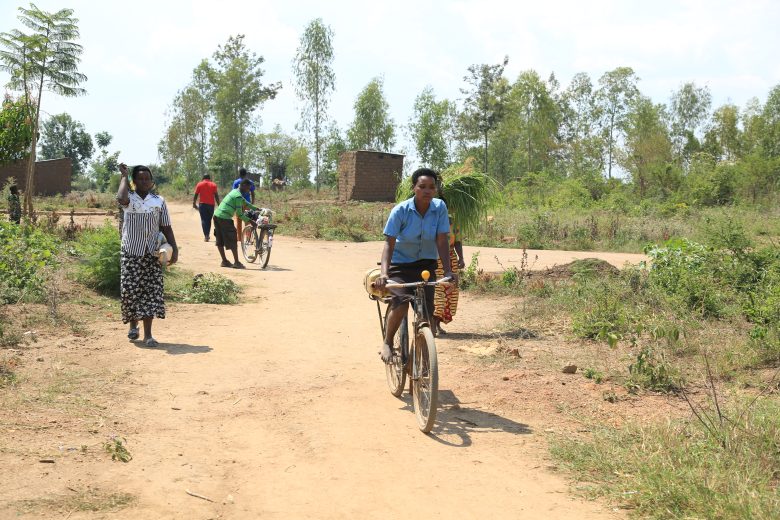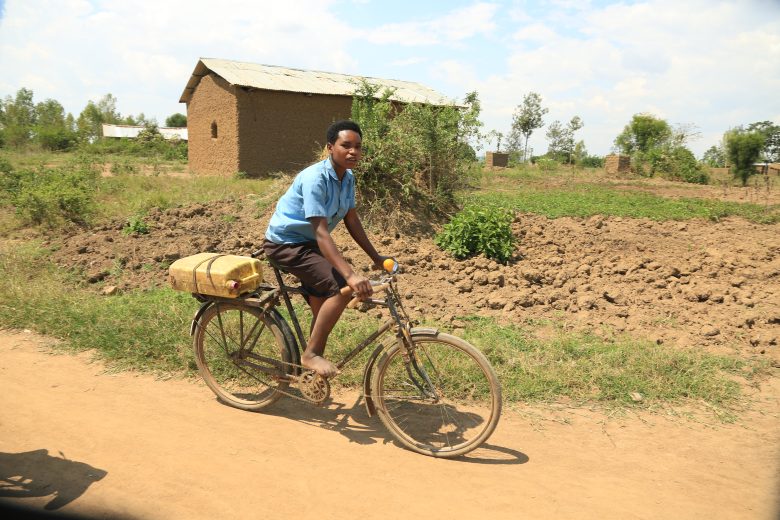Bugesera, one of Rwanda’s driest districts, frequently finds itself at the mercy of harsh weather patterns, with unreliable rainfall and long dry spells. In this context, daily chores like fetching water, going to market, or reaching health centers are not just routines — they are endurance tests. And for women, the stakes are even higher.
In this district, a humble bicycle has become a symbol of survival, dignity, and quiet power — especially for the women who carry much of the district’s burden.
Odette Nyiranzira, a 38-year-old mother of four from Rweru Sector, knows this all too well.
“Before I got my bicycle, I would walk more than 10 kilometers every day just to fetch water,” she says, standing beside the jerrycans strapped tightly to her back wheel. “That would take hours. My children would go to school late, or hungry, because I hadn’t returned. Now, with the bicycle, I make two or even three trips in one morning. We have enough water for drinking, cooking, even for our goats.”
The bicycle that changed her daily reality wasn’t a luxury. It was a gift from her husband’s family, a customary expectation in many Bugesera households. In this district, bicycles have become an essential part of a woman’s dowry — not an ornamental item, but a working tool.
“In Bugesera,” Odette explains with a shy smile, “a bride is often expected to come with a bicycle. It’s as important as pots or a mattress. Without it, how will she support the family?”
A dowry of necessity
Traditionally, dowries across Rwanda included items like livestock, clothes, or kitchen utensils. But in Bugesera, the shifting climate and growing needs have transformed the bicycle into a core component of marriage preparations. It’s not just a gift — it’s a survival tool.
Marie-Claire Mukamana, 26, a newlywed from Ngeruka Sector, recounts how she and her family saved for nearly a year to purchase a sturdy second-hand bicycle ahead of her wedding.
“It was non-negotiable,” she says. “Everyone knows that life here is hard without a bicycle. The bride’s family usually provides it, because they know what kind of life their daughter is entering.”
Marie-Claire now uses her bicycle every morning to transport cassava and sweet potatoes to the local market. The same bicycle takes her to the health center when her infant son falls ill and helps her carry fodder for her two goats.
“It’s my everything,” she says. “It saves time. It saves energy. Without it, I would not manage.”
The burden of water
While water scarcity affects all residents of Bugesera, it is women and girls who carry the heaviest burden. In many homes, water sources are located kilometers away — often at dams, swamps, or boreholes.
 “Some girls drop out of school because they spend too much time fetching water,” says Clementine Uwizeyimana, a community health worker in Gashora Sector. “Others arrive late and exhausted. If there’s no bicycle, the family suffers.”
“Some girls drop out of school because they spend too much time fetching water,” says Clementine Uwizeyimana, a community health worker in Gashora Sector. “Others arrive late and exhausted. If there’s no bicycle, the family suffers.”
According to Clementine, the introduction of bicycles into women’s lives has significantly improved their well-being. Pregnant women now make more regular health center visits. Girls can attend school more consistently. Some families even sell surplus water collected and transported by bicycle to neighbors without access, turning the bike into a modest source of income.
“Bicycles reduce the pressure,” she adds. “They allow women to do more, with less physical strain.”

Beyond transport: A vehicle of empowerment

While many women start using bicycles for water collection, their role often expands. Some transform into small-scale entrepreneurs, turning the bicycle into a business asset.
Aline Uwimana, 34, runs a bicycle-powered juice vending business in Nyamata town.
“I go to the market early with my bicycle, buy fruits, and then return to prepare juice,” she says. “In the afternoons, I load the bottles in a crate and ride around selling. Without my bicycle, I’d have no job.”
In a region where formal employment opportunities for women are limited, bicycles have become micro-enterprise enablers. Women are using them to access cooperatives, attend savings group meetings, and participate in training sessions offered by local NGOs.
“Access is everything,” says Aline. “If you can reach the market, you can trade. If you can reach a bank, you can save. The bicycle connects us.”
Pushing against taboos
Despite their usefulness, bicycles haven’t always been culturally accepted for women. Older generations recall a time when a woman on a bicycle was considered unseemly, or even rebellious.

“People would say, ‘Where is she going like that?’ or accuse you of trying to act like a man,” remembers 56-year-old Apolline Nyirabarera, who still uses her late husband’s bicycle to fetch water.
“But we had no choice. Water doesn’t wait for opinions.”
Today, that stigma is fading, especially as younger women embrace bicycles as a tool of liberation.
Local leaders, too, have begun to recognize the value. “We are encouraging more households to invest in at least one bicycle,” says Tharcisse Niyonsaba, a village chief in Ntarama. “It’s not a luxury, it’s a necessity — especially for women.”
A Future in Motion
Organizations such as World Bicycle Relief and local cooperatives have begun bicycle distribution programs targeting women in Bugesera. Some provide interest-free loans for bicycle purchases, while others offer maintenance workshops to teach women how to repair and sustain their bikes.
Odette, who once struggled to carry water by hand and often fell sick from exhaustion, now dreams of owning a second bicycle — this time, for her eldest daughter.
“She is 14 and already helping with chores. If she has her own bicycle, she can go to school and still help at home,” she says. “I want her life to be easier than mine.”
As Bugesera continues to battle climate challenges, bicycles are no longer just two-wheeled machines. They are agents of change, pushing against drought, poverty, and outdated gender roles — one dusty path at a time.
“In a place where water is far and time is short,” Odette says, brushing dust off her tires, “a bicycle is not just a tool. It is hope on wheels.”








